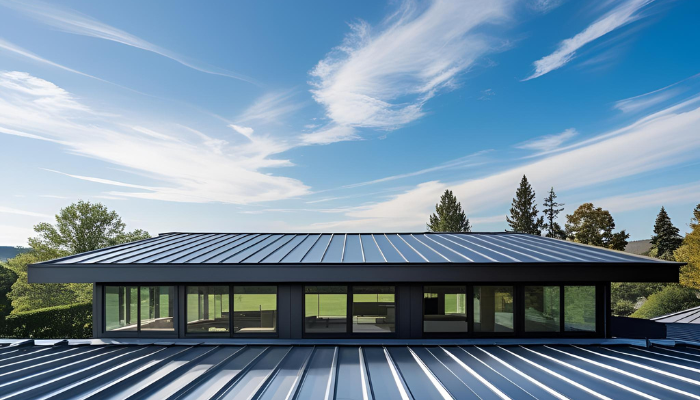The key to choosing between durability, cost, and weather resistance is determining the right gauge to apply to your metal roof. Gauge is a term that may be confusing to homeowners; however, the appropriate gauge will make sure your roof will stand the elements. This guide explains “What Gauge Metal Roof Is Best?” and how to choose the best one for your house.
Understanding Metal Roof Gauge
Gauge is the width of metal in roofing boards; the thinner the metal, the lower the gauge number is. Thick metal is more durable but also more expensive, whereas thinner metal is less expensive yet less resistant.
- 22-gauge:
Thickest and strongest, best suited for commercial or upscale homes. It’s more expensive but withstands dents and harsh weather. - 24-gauge:
One of the favorites for withstanding hard weather, a middle ground between cost and longevity. - 26-gauge:
The home standard provides satisfactory durability in most climates at a middle price point. - 29-gauge:
Thinnest and most affordable, ideal for mild climates or budget-friendly projects, but more likely to dent.
Using the correct gauge is a matter of your environment and cost. Upgrade your home with expert Roofing Installation Services!
Matching Gauge to Environment & Structure
In severe environments where the wind is very high, there might be snow, or even hail, thicker gauges are preferable because they do not get easily damaged. Lighter gauges are suited to climates that are less extreme or to roofs that have good support, such as plywood. When making decisions, always take local weather patterns into consideration.
It’s Not Just About Thickness
Gauge is not the only consideration. Panel profile, e.g., standing seam or corrugated, influences strength and appearance. The capacity of the metal to resist stress also plays a role. Material type also determines performance and lifespan. A whole-building approach guarantees that your roof serves both functional and aesthetic purposes.
Check out our Roof Replacement and Roof Repair Services here!
Selecting the Correct Gauge for Homes
For residential roofs, 24- and 26-gauge are standard. They represent a balance of durability and price. Thinner panels, such as 29-gauge, might exhibit “oil canning”, though. Balance these trade-offs: Thicker gauges are more expensive but more durable, with thinner ones inexpensive up front but potentially requiring sooner replacement.
Having Difficulty Deciding? Ask the Experts
Selecting the right gauge depends on the type of construction of your home, climate, and cost. Errors can lead to costly repairs or unnecessary roof collapse. The professionals at ONLY ROOFING will advise on your site and recommend the optimum gauge, ensuring a durable high performance, and properly-installed roof that meets your needs.
What is the difference between 24-gauge and 26-gauge metal roofing?
The primary distinction is thickness: 24-gauge metal is heavier and more rigid than 26-gauge, and thus it is harder to dent and it slides a little further with less support. Practically, 24-gauge is more hail-resistant, foot traffic-resistant, and durable; 26-gauge is easier to carry and is generally cheaper. Heavier metals also offer a somewhat longer service life and may alleviate oil-canning (wavy surface appearance) in wide panels.
However, 24-gauge is more expensive and increases the weight of the framing. In residential work, either gauge can be used; the selection is dependent on the
- Budget
- anticipated exposure (hail/coastal)
- desired warranty
So, verify manufacturer specifications on the check gauges and local building codes before making decisions.
Final Thoughts
What Gauge Metal Roof Is Best? Heavier gauges, such as 22 or 24, are best in severe climates, and 26 or 29 are better in lighter climates. Call ONLY ROOFING to receive professional consultation and a free quote, and make your roof last!

